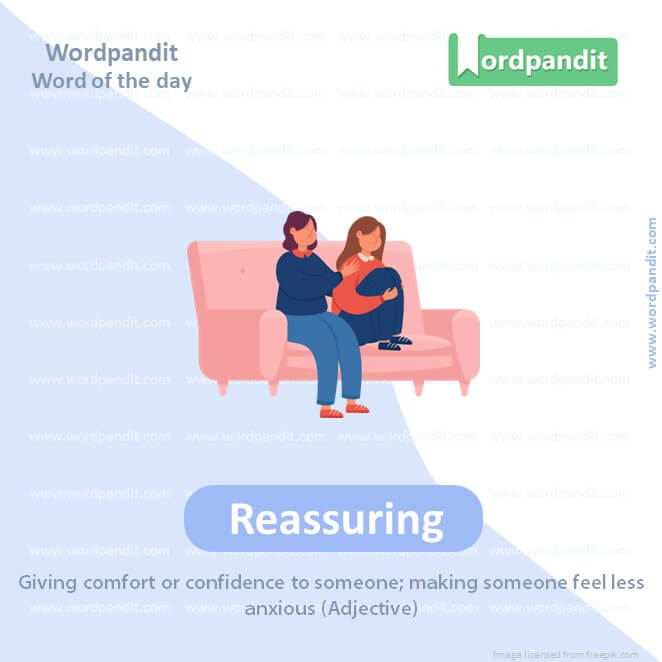Daily Vocabulary Words: List of Daily Used Words
Hi there. Welcome to this special section @ Wordpandit.
Our endeavour here is straightforward: highlighting important daily vocabulary words, you would encounter in The Hindu. This is your repository of commonly used words; essentially, we are posting a list of daily used words. Hence, this has significant practical application as it teaches you words that are commonly used in a leading publication such as The Hindu.
Visit the website daily to learn words from The Hindu.
WORD-1: Stubbornly
CONTEXT: The monetary authority’s repeated emphasis on ‘a durable basis’ underlines its concern that headline inflation and food price inflation in particular have remained stubbornly unpredictable, with the headline Consumer Price Index-based reading stuck above the RBI’s 4% target for 53 months through February 2024.
SOURCE: Not provided
EXPLANATORY PARAGRAPH: When someone doesn’t want to change their mind or do something different, even when others try to convince them, they are acting “stubbornly.” It’s like when you really want to play with your favorite toy and won’t play with anything else, no matter what.
MEANING: In a way that shows determination to not change one’s attitude or position (adverb).
PRONUNCIATION: STUHB-ern-lee
SYNONYMS: obstinately, inflexibly, resolutely, persistently, unyieldingly
USAGE EXAMPLES:
1. He stubbornly refused to admit he was wrong.
2. She stubbornly held onto her beliefs despite evidence to the contrary.
3. The old man stubbornly insisted on doing things his own way.
4. The child stubbornly refused to eat his vegetables.

WORD-2: Reassuring
CONTEXT: Nor are the MPC’s projections for price stability in the new fiscal year significantly reassuring in terms of the target
SOURCE: Not provided
EXPLANATORY PARAGRAPH: When someone says or does something to make you feel better or less worried, that’s called being “reassuring.” It’s like when you’re scared of the dark, and your parent tells you there’s nothing to be afraid of, making you feel safe.
MEANING: Giving comfort or confidence to someone; making someone feel less anxious (Adjective).
PRONUNCIATION: ree-uh-SHOOR-ing
SYNONYMS: comforting, soothing, consoling, comforting, encouraging
USAGE EXAMPLES:
1. Her smile was reassuring and made him feel better.
2. The doctor’s reassuring words calmed the patient’s fears.
3. A reassuring pat on the back can make a big difference.
4. The teacher’s reassuring tone helped the students relax before the exam.
WORD-3: Dampened
CONTEXT: Only too aware that sticky inflation has not only dampened discretionary spending so far but also led to a sharp surge in personal loans for meeting essential expenditure, the RBI chief’s determination to send the elephant back to the forest or risk seeing growth lose momentum again is well justified.
SOURCE: Not provided
EXPLANATORY PARAGRAPH: When something becomes a little wet or less intense, it’s said to be “dampened.” It’s like when you spill water on your shirt, and it feels a bit wet and cool.
MEANING: Made slightly wet or less intense (adjective).
PRONUNCIATION: DAM-puhnd
SYNONYMS: moistened, wetted, subdued, lessened, diminished
USAGE EXAMPLES:
1. The rain dampened their plans for a picnic.
2. His enthusiasm was dampened by the negative feedback.
3. The mood was dampened by the somber news.
4. The dampened cloth helped cool his forehead.

WORD-4: Perplexing
CONTEXT: Suicide is the tragic and untimely loss of human life, all the more devastating and perplexing because it is a conscious volitional act.
SOURCE: Not provided
EXPLANATORY PARAGRAPH: When something is confusing or hard to understand, it’s called “perplexing.” It’s like when you try to solve a puzzle that seems really tricky and makes you scratch your head.
MEANING: Causing confusion and puzzlement (adjective)
PRONUNCIATION: per-PLEK-sing
SYNONYMS: puzzling, baffling, confusing, bewildering, mystifying
USAGE EXAMPLES:
1. The instructions were so perplexing that nobody could figure them out.
2. Her behavior was perplexing to everyone around her.
3. The professor’s lecture was perplexing, leaving the students with more questions than answers.
4. The mystery of the missing keys remained perplexing.
WORD-5: Causative
CONTEXT: Suicide is a complex human behaviour and it is futile to locate a single causative factor.
SOURCE: Not provided
EXPLANATORY PARAGRAPH: When something makes something else happen, like when eating too many sweets causes a stomach ache, it’s called “causative.” It’s like how pressing a button makes a toy play music.
MEANING: Having the power or ability to cause something to happen (adjective).
PRONUNCIATION: KAW-zuh-tiv
SYNONYMS: causal, inducing, producing, prompting, creating
USAGE EXAMPLES:
1. The causative factor of the problem was identified.
2. His actions were the causative agent for the change in policy.
3. The causative relationship between smoking and lung cancer is well-known.
4. They investigated the causative factors behind the economic downturn.

WORD-6: Disseminate
CONTEXT: The immediate task is to disseminate the strategy to all States in India and stakeholders.
SOURCE: Not provided
EXPLANATORY PARAGRAPH: When information or ideas are spread widely to reach many people, it’s called “disseminate.” It’s like when you share a fun game or a story with all your friends so everyone knows about it.
MEANING: To spread or distribute widely (verb)
PRONUNCIATION: dih-SEM-uh-nayt
SYNONYMS: spread, circulate, distribute, propagate, broadcast
USAGE EXAMPLES:
1. The organization aims to disseminate awareness about climate change.
2. The internet has become a powerful tool to disseminate information globally.
3. The company uses social media to disseminate updates and news.
4. Teachers play a vital role in disseminating knowledge to their students.

WORD-7: Palliative
CONTEXT: It covers the full continuum of essential health services, from health promotion to prevention, treatment, rehabilitation, and palliative care
SOURCE: Not provided
EXPLANATORY PARAGRAPH: When something makes you feel better or relieves pain or discomfort, it’s called a “palliative.” It’s like when you have a sore throat, and drinking warm tea with honey soothes it.
MEANING: Relieving pain without dealing with the cause of the condition
PRONUNCIATION: PAL-ee-uh-tiv
SYNONYMS: soothing, alleviating, comforting, calming, relieving
USAGE EXAMPLES:
1. The medicine provided only palliative relief for his symptoms.
2. Music can be a palliative for stress and anxiety.
3. Her kind words were a palliative to his troubled mind.
4. The massage was a palliative measure to ease muscle tension.

WORD-8: Endorsed
CONTEXT: the UN General Assembly unanimously endorsed a resolution urging countries to accelerate progress towards UHC. In India, the high level expert group report, submitted to the Planning Commission in 2011, outlined a government intent to increase public financing for health to 2.5% of India’s GDP during the 12th Plan (2012-17).
SOURCE: Not provided
EXPLANATORY PARAGRAPH: When someone says they agree with or support something, like when your teacher signs your homework to show they checked it and it’s good, it’s called “endorsed.”
MEANING: To approve, support, or recommend something publicly (verb)
PRONUNCIATION: en-DAWRST
SYNONYMS: support, approve, sanction, back, recommend
USAGE EXAMPLES:
1. The celebrity endorsed the new brand of sneakers.
2. The committee endorsed the proposal after thorough review.
3. Her supervisor endorsed her skills and abilities.
4. The organization endorsed the candidate for the upcoming election.
WORD-9: Attainment
CONTEXT: the attainment of the highest possible level of good health and well-being, and universal access to good quality health care services without anyone having to face financial hardship as a consequence” as its goal, which aligns with the UHC target.
SOURCE: Not provided
EXPLANATORY PARAGRAPH: When you achieve or reach a goal, like when you learn to ride a bike or finish a puzzle, it’s called an “attainment.” It’s like getting a gold star for doing something really well.
MEANING: The achievement of a goal or accomplishment of something (noun).
PRONUNCIATION: uh-TAYN-muhnt
SYNONYMS: achievement, accomplishment, attainment, success, realization
USAGE EXAMPLES:
1. Graduating from college was a significant attainment for her.
2. His artistic attainment was recognized with an award.
3. The company celebrated the team’s attainment of the sales target.
4. Hard work and dedication are essential for personal attainment.
WORD-10: Vicious
CONTEXT: The constitutional right to health is critical to breaking the vicious cycle of poverty and poor health that will otherwise continue to perpetuate inequality in all spheres of life, including education, opportunity, wealth, and social mobility.
SOURCE: Not provided
EXPLANATORY PARAGRAPH: When something is really mean, aggressive, or causes harm, it’s called “vicious.” It’s like when a dog barks loudly and tries to bite people, it’s being vicious.
MEANING: Extremely violent or aggressive, or intentionally harmful (adjective).
PRONUNCIATION: VISH-uhs
SYNONYMS: cruel, brutal, savage, malicious, aggressive
USAGE EXAMPLES:
1. The dog became vicious when strangers approached its territory.
2. He faced a vicious attack from his opponents during the debate.
3. The storm caused vicious damage to the coastal areas.
4. Her words were vicious, leaving emotional scars.
Vocabulary Daily Words
Among the myriad aspects of language learning, the role of ‘vocabulary daily words’ attests to their undeniable importance. These everyday words form the bedrock of communication. Whether used in casual chat or formal discussion, the fluency and understanding of ‘vocabulary daily words’ can significantly uplift the quality of interaction. However, the vital question is, how to effectively learn these ‘vocabulary daily words’?
The crux of learning ‘vocabulary daily words’ lies in a well-rounded approach that encompasses exposure, understanding, memorization, and practice. Rote memorization might seem like a quick solution, but it lacks context and, thereby, retention. Hence, opt for a diverse range of resources like books, newspapers, podcasts, and digital media. These will bring ‘vocabulary daily words’ to life, providing real-life usage examples and making the learning process inherently engaging.
Next, using memory-enhancing techniques can significantly improve retention of ‘vocabulary daily words’. Techniques such as flashcards or the Leitner System align with the principles of spaced repetition, allowing more effective and long-term learning. Incorporating mnemonic devices, associating new words with unique stories or images, can further facilitate this learning process.
The key to fully grasping ‘vocabulary daily words’ lies in practical usage. Make it a habit to use these words in your daily communications. Whether it’s a friendly conversation, a professional email, or a social media post, try integrating these new words. Doing so provides hands-on practice, strengthening your comprehension and application of these words.
In a nutshell, ‘vocabulary daily words’ are a treasure in the language learning landscape. By harnessing diversified resources, utilizing memory techniques, and actively using these words, your grip on the ‘vocabulary daily words’ will strengthen significantly. So, turn the pages, hit play, start a conversation, and let these ‘vocabulary daily words’ shape the story of your linguistic journey.













